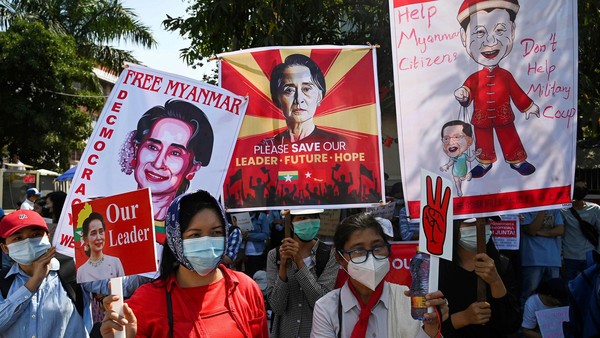In the early morning of February 1, 2020, a military coup took place in Naypyitaw, the capital of Myanmar. Myanmar's military caused confusion by detaining key figures of the country, including national adviser Aung San Suu Kyi, and declaring a state of emergency. The international community, along with the people of Myanmar, is actively criticizing the injustice of the coup. Let us find out why Myanmar's military launched the coup despite fierce criticism from the international community and its citizens.

1. The Background and Current Situation of the Coup
a. How It Happened
Myanmar's coup began when its commander-in-chief, Min Aung Hlaing, raised allegations of electoral irregularities of the current administration in the polls that was held in November 2020. Myanmar's military seized power after detaining a total of 24 senior national leaders, including state adviser Aung San Suu Kyi, President Win Myint, and other leaders of the National League for Democracy. In the case of Aung San Suu Kyi, Myanmar's military detained and charged her for violating export and import laws. The military found several illegally imported and unauthorized walkie-talkies while searching her home and so charged her two days later, on the 3rd of February. If she is found to be guilty, she will be sentenced to up to three years in prison by the law. Meanwhile, commander-in-chief Min Aung Hlaing declared a state of national emergency for a year and replaced the preexisting government by appointing eleven new ministers and deputies to do politics on behalf of the preexisting ministers. He also introduced a complete military political system, taking over legislative, judicial, and administrative power.
b. The Current Situation in Myanmar
There are assertions that the military shut down the country’s Internet to prevent the current situation in Myanmar from being transmitted through social media and spread to foreign media. According to an announcement by NetBlocks, a non-governmental organization that monitors cybersecurity and Internet control systems, communication in Myanmar was cut short from around 3 a.m. local time on February 1st, the day the coup took place. Since the coup began at 5:30 a.m. on February 1, it means that the communication was intentionally cut off two hours before the coup.
The people of Myanmar are strongly protesting against the military coup as the preexisting government was the hard-earned fruit of Myanmar’s democracy earned relatively late in 2015. Citizens are banging pots and pans on the streets, mainly in the capital and the biggest city, Yangon, voicing vehement denunciation of the coup. In Myanmar, banging on pots and pans to make loud noises when driving out the devil. The Myanmar Civil Disobedience Movement, formed by medical staff across the country, is going on strikes against the military who conducts acts aimed at achieving military objectives rather than public safety in the face of the national crisis by the COVID-19. The movement is held in more than 70 hospitals across more than 30 regions of Myanmar, and hospitals participating in the movement are on strike except for emergency rooms. Also, some shots were fired by the military in the capital Naypyitaw and killed a 20-year-old woman, angering the crowd even more.
2. The Differing Responses from Around the World
a. The Subtle Tension Between U.S. and China
For the United States, the coup in Myanmar is of grave importance as it is the Biden administration's first diplomatic test. At first, the U.S. government did not recognize the coup as a coup. This was because if they do, and actively sanction Myanmar's anti-democratic coup, Myanmar is likely to lean toward China. The U.S., which keeps China in check, is reluctant to allow China to increase its influence in Southeast Asia. However, as of February 11, the U.S. has officially recognized the coup. The U.S. also sanctioned 10 Myanmar military officials, including commander-in-chief Min Aung Hlaing. The U.S. is currently in a dilemma as it cannot be passive and stand by the sidelines watching as an anti-democratic coup develops, nor do they want to be actively involved and increase Chinese influence on Myanmar. China, on the other hand, has declared that China will not intervene since Myanmar's military coup is a domestic issue in Myanmar.
b. Other Responses
The foreign ministers of the G7 -consisting of the United States, Britain, France, Canada, Germany, Italy, and Japan- called on the Myanmar military to immediately end the state of emergency and restore power to the democratically elected government. They also urged to release all those unjustly detained, respect human rights and the rule of law. António Guterres, the U.N. Secretary-General, said that he encourages a peaceful dialogue to resolve differences.
Myanmar is a country that has only achieved democracy in 2015 by democratically electing its leader after a long period of military politics. If it collapses in front of the military regime now, the hard-earned democracy will degenerate again, and the few decades that Myanmar people have devoted to democracy will be for nothing. The people of Myanmar are uniting now to overcome this crisis and develop into a more advanced Myanmar. We shall have to wait and see how the coup in Myanmar will unfold from now on.

